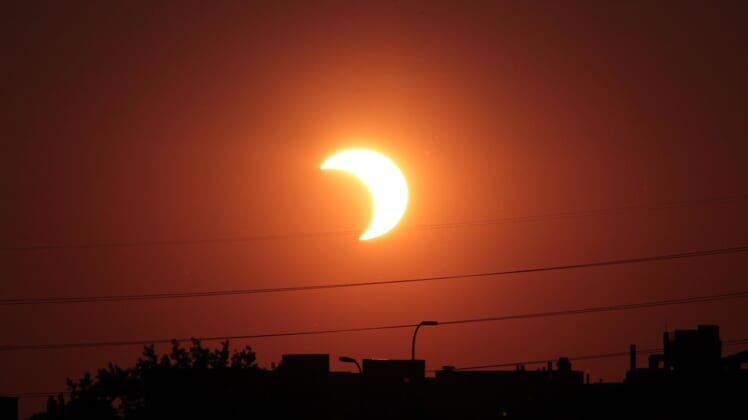It’s Time to Watch the Solar Eclipse-Safely

In just a few days, you’ll get the rare chance to watch a scientific phenomenon that Americans haven’t seen in nearly 40 years——a total solar eclipse. It’s the moment when the moon passes in front of the sun and blocks most of its light from the earth. You’ll want to gather the whole family for this rare event, experiencing the solar eclipse together and, of course, safely.
Right about now, you might be hearing all kinds of rumors about solar eclipses. Will chaos ensue all over the country? Will animals go berserk? Then, one of the most common ones: will you go blind by staring directly at the eclipse?
First, you don’t need to be afraid of this solar eclipse. It has happened before all across the world, and chaos has yet to overtake a country because of it.
Second, staring at the sun in general will cause eye damage, but you can watch a solar eclipse safely. In this instance, the rumors have some bearing because you can experience temporary blindness and permanent eye damage. Let’s look at what you need to know about watching the solar eclipse next Monday safely.
The Problem with Looking at the Sun
When you’re sun-bathing at the beach or driving your car, you likely reach for something to shade your eyes. In these situations, you’re looking for a way to dim the sun’s brightness so that you can see clearly.
Most of these sunglasses will also have protection from the sun’s ultraviolet radiation. While you might not realize it, you’re taking all of these precautions for a reason, and you’re not even planning to stare directly into the sun for these events.
Dr. Russell Van Gelder, a clinical spokesman for the American Academy of Opthalmology, does not recommend looking directly at the sun with an unprotected eye. According to him, even looking for short periods of time can cause severe eye damage.
Not only do the sun’s rays have an intense energy and heat, but your eye’s lens also narrows its focus onto the sun. Together, the intensity and energy created by this narrowed focus and powerful light will cause eye damage.
Van Gelder says that eye doctors can easily spot damage caused by the sun in their patients. He told Live Science that “it looks like someone took a hole punch and just punched out the photoreceptive cells in the retina.”
Still, you shouldn’t shy away from watching this amazing opportunity. You just need to take precautions when you’re looking at the sun, especially the solar eclipse.
How to Get the Most out of Massage Therapy
How to Watch Safely
Just as you would don your sunglasses on a bright day while driving, you need some protection over your eyes during the solar eclipse. However, you’ll need something stronger than normal sunglasses. Experts recommend solar eclipse glasses.
These glasses use a strong filter with ISO 12312-2 and are regulated by an international safety standard. You’ll want to buy these inexpensive glasses from a reputable manufacturer or certified seller since many unsafe glasses are already filling the Internet.
The American Astronomy Society (AAS) has a list of reputable manufacturers where you can purchase these. Also, the AAS recommends several tips to ensure safety, including:
- Inspect your solar eclipse glasses.
Look for any tears or scratches on the filter before using it next week. If you see any damage, throw it away and find better protection for your eyes.
2. If you’re using binoculars or a camera, buy a solar filter.
Looking through media devices will not protect your eye by itself. In this case, look into getting a solar filter for your device. Do not use it without this protection since it may cause serious damage to your eyes.
3. Wear the solar eclipse glasses over your normal glasses.
If you usually wear glasses, keep them on during the eclipse. Simply place the eclipse glasses directly on top.
4. Watch children closely during the eclipse.
You’ll definitely want the whole family to watch the solar eclipse. Just be sure that your children are using the solar filters and/or glasses properly. You may want to practice using them beforehand.
5. Only take away the solar filter during totality.
If you prefer to watch the total eclipse without the filter, you can. Once the sun starts peeking from the other side again, you should return to using the eclipse glasses. At the end of the eclipse, look away from the sun before taking off the glasses again.
Watching the total solar eclipse next week will be an event that you don’t want to miss. By following these steps and using a solar filter or eclipse glasses, you and your family can watch the sun disappear behind the moon safely.
